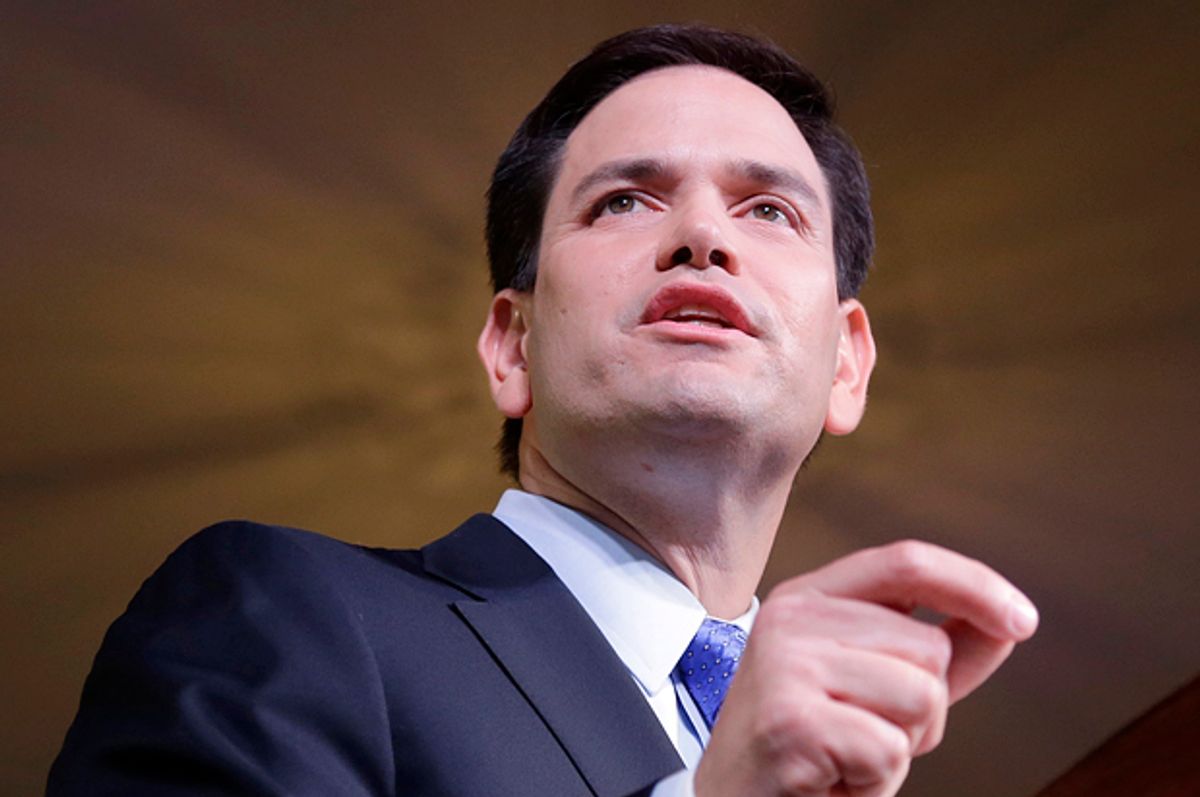For the third time in his political career, Marco Rubio has made a solemn pledge to Grover Norquist that he will never, ever raise taxes. Norquist’s anti-tax increase pledge has been a staple of Republican politics for a long time now, and Rubio happily signed it as a state legislator in Florida, again as a U.S. senator, and now once more as a candidate for the presidency. There was no actual reason for Rubio to genuflect before D.C.’s most prominent anti-tax zealot again, but he clearly wants to draw a bright line between himself and another Florida Republican in the 2016 mix, Jeb Bush, who has refused to sign Norquist’s pledge. Rubio, unlike Jeb, isn’t afraid to lend his name to this gimmicky stunt as many times as is necessary.
The practical realities of governing make Norquist's pledge virtually impossible to adhere to, and Rubio has violated the pledge and its principles a number of times in the past, but let’s take him at his word and presume that President Marco Rubio will not raise a single red cent in taxes. That’s going to cause some problems for the rest of the Rubio agenda.
Let’s start with Rubio’s own tax plan, which will have to be tweaked a bit since it raises taxes on some lower- and middle-income families. Once he irons out those kinks, what he’ll be left with is a plan that eliminates all manner of taxes on rich people (capital gains, estate taxes, etc.) and throws some new tax credits at the middle class, the combined effect of which will be to rip an unprecedentedly large hole in the federal budget. Rubio would like to pretend that the shortfalls will be made up for by the rapid economic growth generated by the tax cuts, but there is no reason to believe that would happen.
That’s a problem in and of itself, but it also butts up hard against Rubio’s other disastrous economic policy proposal: a balanced budget amendment to the Constitution. Balanced budget amendments are a bad idea on their own, but Rubio’s talking about mandatory budget balancing while also reducing federal revenues by roughly $4 trillion over a decade. That’s going to require some deep and painful spending cuts.
And that brings us to yet another problem. Rubio wants to cut taxes and balance the budget but also drastically increase defense spending and maintain current levels of anti-poverty spending. This, as the Washington Post’s Matt O’Brien observed, leaves Rubio at odds with basic mathematics:
That doesn't leave a lot of places to find savings. There probably aren't any in non-defense discretionary spending—things like roads and research—when it's already at a 40-year low. So you'd have to get them all by cutting Social Security and Medicare, and cutting them now. Rubio, though, only wants to "reform" entitlements for future seniors, not current ones. And that leaves you with big, fat deficits for a good, long while.
There is no plausible way in which Rubio can do all this at once, so we have to view his thoroughly unrealistic economic vision as a question of priorities. When push comes to shove, which policies would Rubio jettison to give his policy platform a sheen of realism?
Well, the man has promised three times now that he’s never going to raise taxes, and I believe him. I also believe he’ll never back down from the tax cuts he’s already proposed – tax cuts for the rich are critical to the Republican policy agenda, and conservatives are already grumbling that Rubio isn’t reducing the tax burden on the wealthy by as much as he could. One would also have to assume that boosting the defense budget is also sacrosanct to Rubio, given that he’s been positioning himself as 2016’s national security candidate.
That leaves the rest: a balanced budget, new tax credits for the middle class, and anti-poverty spending. A balanced budget amendment would be an all-but impossible lift politically and Republicans have happily run up the deficit to cut taxes in the past, so we can scratch that off. As noted, old-fashioned supply-side Republicans are already suspicious of Rubio’s tax proposals and pouting because he’s not proposing deeper rate cuts for top earners, so we can put a big fat question mark next to the tax credits. And the desire to maintain anti-poverty spending levels would compete with the Republican urge to cut overall spending while begging off major cuts to politically sensitive entitlement programs.
Brian Beutler neatly summed up Rubio’s economic rhetoric earlier this month: “Either Rubio is promising to run up bigger deficits than any president in history, or he’s swindling someone.” Big deficits certainly aren’t off the table, but the fact that he’s promising over and over to keep tax revenues low as the centerpiece of a mathematically impossible economic policy platform points strongly towards a swindle.

Shares